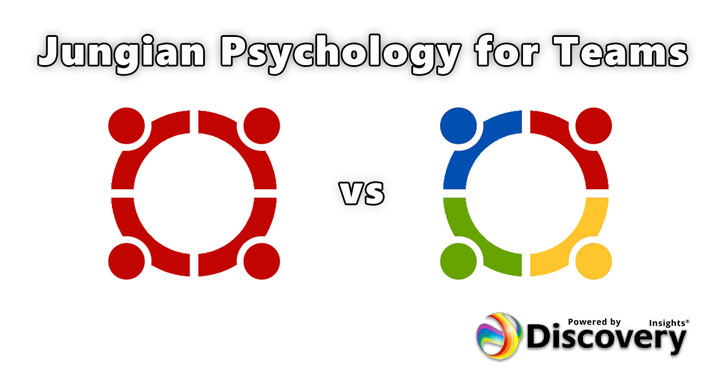Discover Yourself – Jungian Psychology for Teams

In the past I’ve talked about the basics of Jungian psychology and how psychometric testing can benefit businesses. Today I’ll dig more into this topic to show the practical ways that Jungian psychology can help to form, manage, and motivate a team at work.
Expressing Preferences
One of the most valuable ways that personality testing can benefit a team is by giving team members space to express their preferences on matters such as favored methods of communication, feedback style, motivation, and so on. In the typical workplace, there are processes that are followed and methods that are used across entire departments or companies. But it can help to tweak these processes in recognition of the fact that individual workers have different habits and styles which allow them to work mostly effectively. For instance, maybe one person prefers to always be kept in the loop about a project, even including the small details that don’t directly affect them, so that they can understand the overall project. Other people could find constant updates that they don’t need to be annoying or distracting.
In this way, both performing personality assessments and the process of discussing personality test results with a team are opportunities for team members to express their ideal working situation and setup. A manager might not necessarily be able to meet all of these preferences – for example, if a team member indicates that they prefer to communicate via email over communicating by phone, there might still be a weekly meeting with a client which needs to be done over the phone. But often, preferences can be taken into consideration with no loss of productivity or achievement. In fact, letting people choose the manner and style in which they work can be beneficial to both morale and results.
Different Strengths of Different Team Members
Some people think that in order to be successful, a team needs to be made up of members with similar personality types. It’s common, especially among new managers, to think that a team with similar temperaments will work together more efficiently. However, a team made up of a mixture of personality types is usually more effective. For example, it can help to have one team member who is outgoing and social, who can build bonds with other teams; one member who is detail oriented and will check all work for mistakes; one team member who takes a leadership role and corrals and motivates the others, and so on.
For this reason, it’s good to have a team that is diverse in terms of personality type. What a Jungian style personality assessment can describe is the strengths and weaknesses of each team member, so that tasks can be assigned accordingly. Of course, tasks can also be assigned to someone who is not specifically typed to be good at them. For example, if a team member has a role that requires communicating with customers then they will need to develop strong social skills, even if they are naturally more introverted. It is not impossible for an introverted person to perform this task well, but they may need more coaching and support in this area than a person who is naturally more outgoing and sociable.
Understanding Interpersonal Relations
Another useful way to apply personality data to teams is using it to understand interpersonal conflicts. Even on the most professional teams, there will still be times when the needs or priorities of team members conflict. When this happens, a work issue can quickly become personal and team members can feel bullied, undervalued, or unhappy.
Understanding personality types can help throw light onto these conflicts. For example, it might be that one person values direct, forthright discussions, but another person perceives this communication style as brusque or rude. By educating each person about the other’s perspective, these team members can identify the source of their conflict and adapt to the needs of the other. Or if someone is anxious because they feel they are being left out of the loop, it will help other team members to understand not only that they ought to update the person more often, but also the reason for this action (that the person is someone who likes to keep an eye on the big picture and therefore wants to stay informed).
Using Personality Data to Build a Team
There are many ways that psychology insights can be used to build a team. One of the most common uses of personality assessments is during recruitment, where candidates are given personality assessments as part of the hiring process. These assessments can be a great source of information, but they should be used carefully. Too often, a hiring manager has an idea of what type of person that they want on their team – for example, that they want a new hire to be of a similar age and background to other team members, with similar interests and experience. This can lead to an overly narrow focus in which excellent candidates are passed over because they do not fit the narrow scope of what the hiring manager is looking for.
Like the concept of “company culture,” personality assessments can be used in a way that is discriminatory if they are not approached with care. A personality assessment should give information about the potential strengths, weaknesses, and preferences of a candidate, but hiring managers should remember that a diversity of personality types on a team is a key to success. Managers should not be afraid to hire a great candidate with relevant experience just because they are not the “right” personality type.
More Ways to Use Personality Data
Other ways that learning about personality types can benefit a team include as part of team building exercises so that team members can learn more about each other and how to interact, in personal and professional development such as identifying current weaknesses, or mentoring and coaching to improve on those weaknesses. But perhaps the most valuable use of personality information is the creation of a space in which a team’s communications, processes and brainstorming can be improved.
In the next post I’ll discuss how to effectively lead a team with a post on self-aware leadership, so come back soon for that!



Leave a Reply
Want to join the discussion?Feel free to contribute!